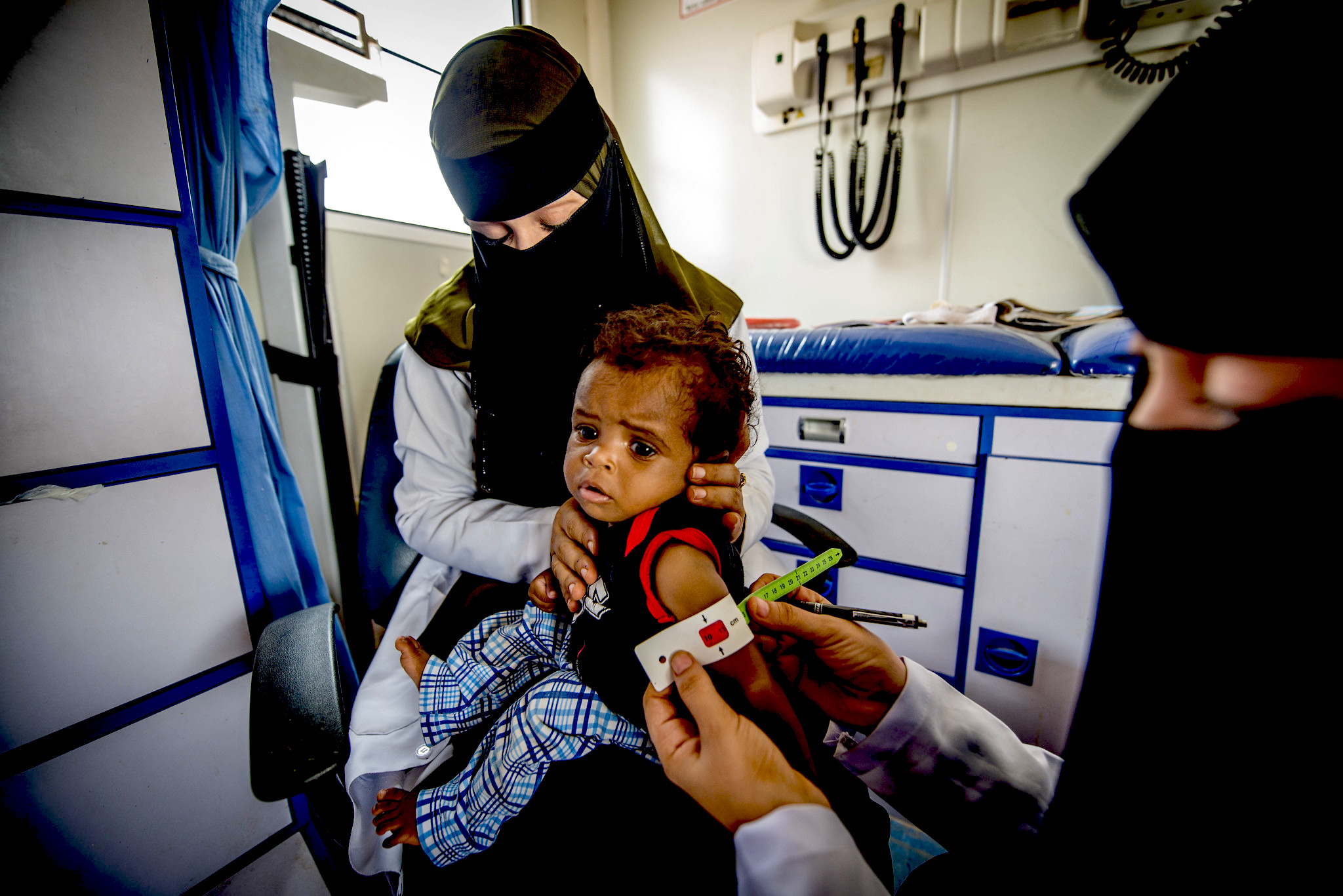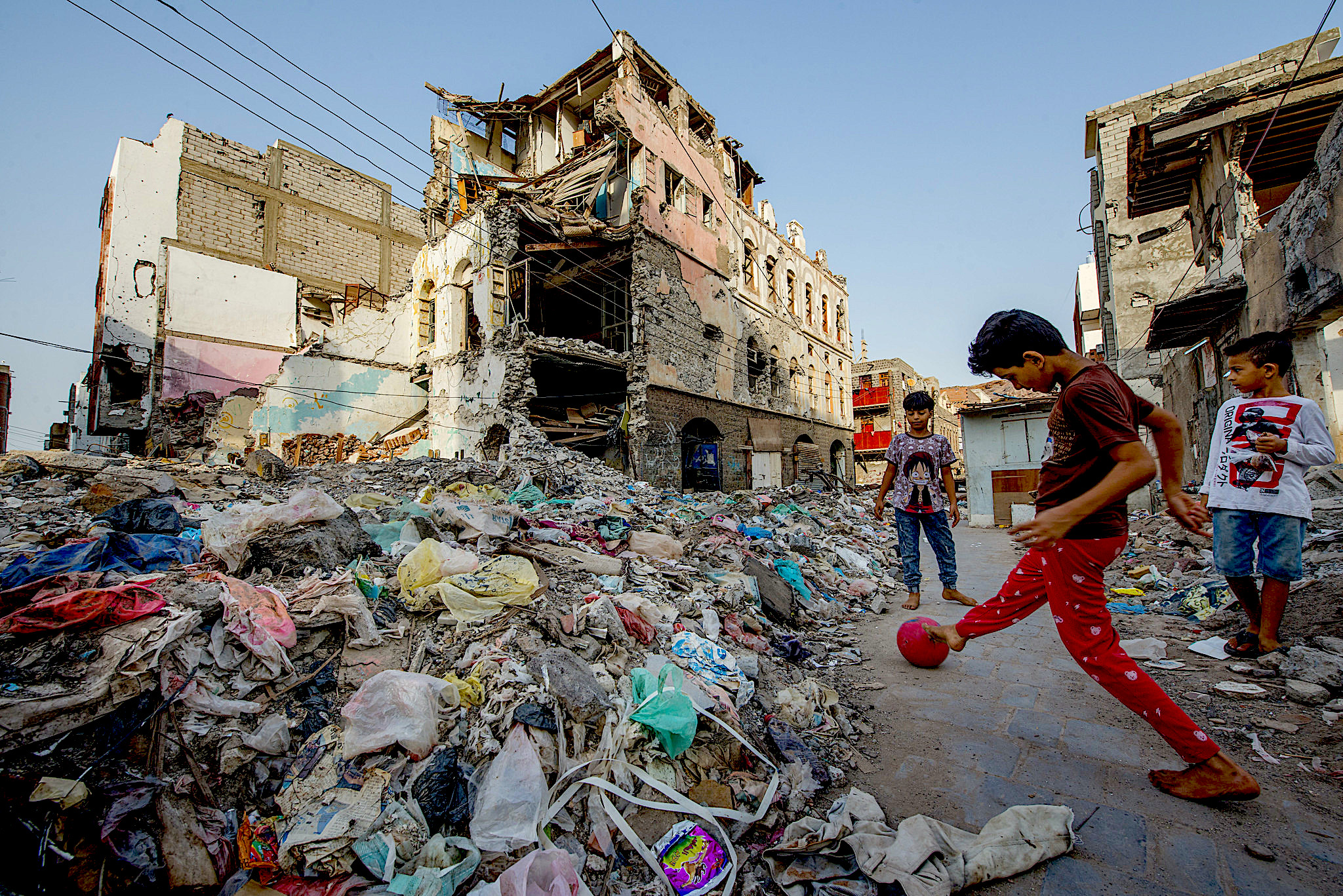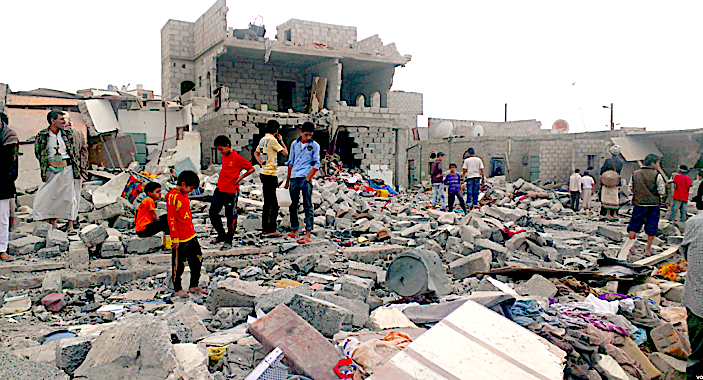Baher Kamal reports on U.N. agencies’ warnings of the catastrophic consequences of the Saudi Arabia/UAE coalition’s war on Yemen, which is being fueled by U.S. and European arms deals.

June 27, 2019: A woman with her severely malnourished baby who live in a refugee camp near Aden in war-torn Yemen. (EU Civil Protection and Humanitarian Aid, Flickr,Peter Biro)
By Baher Kamal
Inter Press Service
Yemen’s already dire hunger crisis is teetering on the edge of outright catastrophe, with 17.4 million people now in need of food assistance and a growing portion of the population coping with emergency levels of hunger, three UN agencies warned on March 14.
“The humanitarian situation in the country is poised to get even worse between June and December 2022, with the number of people who likely will be unable to meet their minimum food needs in Yemen possibly reaching a record 19 million people in that period.”
This has been the strong alarm launched by the Food and Agriculture Organization of the United Nations (FAO), the World Food Programme (WFP) and the U.N. Children’s Fund (UNICEF), following the release of a new Integrated Phase Classification (IPC) analysis on Yemen.
At the same time, an additional 1.6 million people in the country are expected to fall into emergency levels of hunger, taking the total to 7.3 million people by the end of the year, the agencies added.
The IPC report also shows a persistent high level of acute malnutrition among children under the age of 5. Across Yemen, 2.2 million children are acutely malnourished, including nearly more than half a million children facing severe acute malnutrition, a life-threatening condition. In addition, around 1.3 million pregnant or nursing mothers are acutely malnourished.
Situation Deteriorating
“The new IPC analysis confirms the deterioration of food security in Yemen. The resounding takeaway is that we need to act now. We need to sustain the integrated humanitarian response for millions of people, including food and nutrition support, clean water, basic health care, protection and other necessities,” said the U.N. resident and humanitarian coordinator for Yemen, David Gressly.
“Peace is required to end the decline, but we can make progress now. The parties to the conflict should lift all restrictions on trade and investment for non-sanctioned commodities. This will help lower food prices and unleash the economy, giving people the dignity of a job and a path to move away from reliance on aid,” he added.
War, The Primary Driver

Yemeni children play in the rubble of buildings destroyed in an air raid in 2019. (Peter Biro, EU Civil Protection and Humanitarian Aid, Flickr, CC BY-NC-ND 2.0)
Conflict remains the primary underlying driver of hunger in Yemen. The economic crisis – a by-product of conflict – and the depreciation of the currency have pushed food prices in 2021 to their highest levels since 2015, warn the United Nations agencies.
The Ukraine war is likely to lead to significant import shocks, further driving food prices. Yemen depends almost entirely on food imports with 30 percent of its wheat imports coming from Ukraine.
“Many households in Yemen are deprived of basic food needs due to an overlap of drivers,” said FAO Director-General QU Dongyu.
“FAO is working directly with farmers on the ground to foster their self-reliance through a combination of emergency and longer-term livelihood support, to build up their resilience, support local agrifood production, and offset people’s reliance on imports.”
Famine to Rise Five-Fold
An extremely worrying new data point is that the number of people experiencing catastrophic levels of hunger — IPC Phase 5, famine conditions — is projected to increase five-fold, from 31,000 currently to 161,000 people — over the second half of 2022.
“These harrowing figures confirm that we are on a countdown to catastrophe in Yemen and we are almost out of time to avoid it,” said WFP Executive Director David Beasley. “Unless we receive substantial new funding immediately, mass starvation and famine will follow. But if we act now, there is still a chance to avert imminent disaster and save millions.”
WFP was forced to reduce food rations for 8 million people at the beginning of the year due to a shortage of funding. With these reductions, households are receiving barely half of the WFP standard daily minimum food basket. Five million people who are at immediate risk of slipping into famine conditions have continued to receive a full food ration.

Neighborhood in Yemen’s capital city, Sanaa, months after an airstrike, Oct. 9, 2015. (Almigdad Mojalli/VOA, Wikimedia Commons)
Meanwhile, acute malnutrition among young children and mothers in Yemen has been on the rise. Among the worst hit governorates are Hajjah, Hodeida and Taizz. “Children with severe acute malnutrition are at risk of death if they don’t receive therapeutic feeding assistance.”
“More and more children are going to bed hungry in Yemen,” said UNICEF Executive Director Catherine Russell. “This puts them at increased risk of physical and cognitive impairment, and even death. The plight of children in Yemen can no longer be overlooked. Lives are at stake.”
Yemen has been plagued by one of the world’s worst food crises. Parents are often unable to bring their children to treatment facilities because they cannot afford transportation or their own expenses while their children are being assisted.
The ongoing war on Yemen was launched seven years ago by a Saudi Arabia/United Arab Emirates coalition, heavily armed by the United States and Europe with arms deals amounting to an estimated 100 billion U.S. dollars.
Other Brutal Wars
In addition to the dramatic consequences of the Western sanctions on Venezuela, with 95 percent of Venezuelans living in extreme poverty, hundreds are forced every day to walk to neighboring Colombia in search of work, as reported on 12 March 2022 by Catherine Ellis on openDemocracy.
And there are other brutal wars. Just two examples:
Syria. Syria’s 11 years of brutal fighting has come at an “unconscionable human cost”, subjecting millions there to human rights violations on a “massive and systematic scale”, said the UN chief on March 11, 2022, marking yet another tragic anniversary.
South Sudan Bracing for ‘Worst Hunger Crisis Ever: More than 70 percent of South Sudan’s population will struggle to survive the peak of the annual “lean season” this year, as the country grapples with unprecedented levels of food insecurity caused by conflict, climate shocks, Covid-19, and rising costs, the UN’s World Food Programme (WFP) warned on March 11.
Afghanistan, Iraq and Libya fall among those countries suffering the dramatic effects on civilian population of the U.S.-led war coalitions.
Shouldn’t ALL wars be condemned?
Baher Kamal is senior adviser to the IPS director general on Africa & the Middle East. He is an Egyptian-born, Spanish-national, secular journalist, with over 43 years of experience. Since the late 70s, he specialised in all development related issues, as well as international politics. He also worked as senior information expert for the Euro-Mediterranean Partnership at the European Commission in Brussels, and as the first information officer and spokesperson at UNEP’s Mediterranean Action Plan in Athens. Kamal speaks Spanish, Arabic, English and Italian.
This article is from Inter Press Service

The Saudis and Neocons in the U.S. are saying .. ‘FINALLY! we have been trying to do this for years and now it is paying off’
The attitude of the “West” is that these poor countries are of importance only for “our” needs for oil, for power, for controlling the world. Any deaths or destruction are just collateral damage, and what we do is democratic and free, never to be investigated by UN bodies, as we have our own “rules-based international order”.
None of the terrible US?NATO crimes in Yugoslavia, Libya, Iraq are even taken on by the ICC, as we are in charge and decide what is worth investigating. Read Edward Herman and David Peterson’s book “The Politics of Genocide” to find why this tragedy is exactly an example of what counts in the “West” as a crime and what is just normal behaviour by the civilised world as defined by the Ukraine leadership now.
Billions of aid, military and humanitarian, going into Ukraine and yet there are babies starving in Yemen and other countries…. Where are our priorities? Why do we have no shame?
A saying from a distant youth: ‘What the eyes don’t see, the heart doesn’t grieve over’.
For seven years, the reality of Yemen (war and blockade) has been kept away from front pages and screens. The bombs dropped were supplied by Europe and America, maintaining well-paying jobs – and we all need to work (apart from a certain few overlords) – and providing taxes for Western governments.
Now the front pages and screens show only the the Ukraine tragedy which is real enough.
However, the ‘West’ now screams about Russia causing all our economic woes through the inflated oil and gas prices with Europe begging these Gulf countries for more in order to replace the Russia source of cheap fuel.
And so it is that European and American taxpayers and consumers pay for the weapons that are dropped on Yemen by UAE/ Saudi ‘Coalition’.
Thank you Mr Trump, Mr Biden, Mr Johnson, Mrs von ……
Yes
All wars should be condemned.